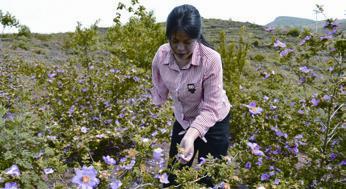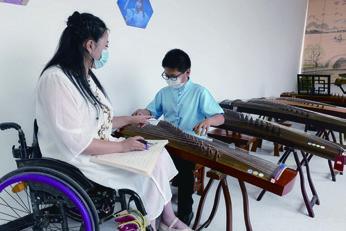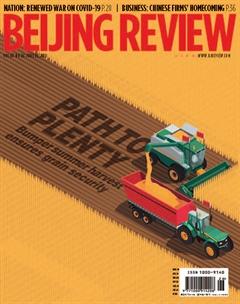Life Beyond Limits
By Lu Yan
At the age of 13, Zhao Yang, a resident of Xiaozhao Village in Nangong City, Hebei Province in north China, lost his arms due to electric shock. He said the accident changed his life in the blink of an eye. He had to give up schooling. “I was in desperation at that time.”
But thanks to the help and care of his family and relatives, Zhao gradually learned to take care of himself and started thinking about what he could do in future.
In 2003, he learned to use the computer, typing with his feet. Six years later, he started his online store selling quilts with cotton wadding, as Nangong is rich in cotton.
Now, the annual sales of Zhaos store exceed 1 million yuan ($141,000), and its products are also exported to countries like Malaysia and Viet Nam.
“I can type more than 40 Chinese characters in a minute. I can manage customers on my own,” the 33-year-old said.“Dealing with four or fi ve customers simultaneously is a piece of cake.”
After becoming successful in his business, Zhao has shared his experience with young entrepreneurs and helped seven of them open their own online stores. He also plans to cooperate with the local federation of disabled persons and special education institutions to help more people with disabilities start their own business.
Targeted assistance
China aims at eliminating absolute poverty by the end of this year. Since the concept of targeted poverty alleviation, which requires tailored relief efforts for different regions and individuals, was first put forward by President Xi Jinping in 2013, progress has been made in poverty reduction among people with disabilities.The number of disabled people grappling with extreme poverty dropped to about 500,000 by the end of 2019, a significant decline from more than 7 million in 2013, and 1.2 million disabled people shook off poverty last year alone, according to Xie Hongde, a poverty relief offi cial with the China Disabled Persons Federation(CDPF).
In 2012, the General Office of the State Council issued an outline on poverty reduction of rural people with disabilities, emphasizing governments role in helping them out of poverty.
The outline also encouraged development-oriented poverty reduction, saying that assisting poor rural people with disabilities to join the workforce and increase their income is fundamental for them to shake off poverty.
Local governments have been encouraging people with disabilities to obtain employment near where they live with the help of enterprises and poverty alleviation bases.
Wei Zhongyong contracted polio when he was 2 years old and now walks with crutches. In 2014, he started to breed black goats and cattle in his hometown in Guangxi Zhuang Autonomous Region in south China, a mountainous place suitable for raising quality black goats and cattle.
At the initial stage of the business, he attended breeding skill training by local organizations for persons with disabilities and received financial support from the government. Years later, the business not only enabled him to shake off poverty and earn a decent living, but also inspired him to engage more fellow villagers in a cooperative he established with subsidies from the local government.
With special-purpose loans from a bank and subsidy from the government, poor households can buy a share in the cooperative and receive dividends. In 2019, all 34 households with disabled members participating in Weis cooperative shook off poverty.
Guangyuan in Sichuan Province, southwest China, also exemplifi es the role of local governments in helping poor residents with disabilities live a better life. The city has organized technical training to equip disabled people with skills for employment, and held career fairs especially for them. So far, more than 99 percent of the poor and disabled persons in the city are out of poverty.
Helping hands
According to Xie, one third of the poor households have one or more family members with disabilities, most of whom are unable to work. Social forces including enterprises, social organizations and volunteer groups are encouraged to extend a helping hand.Yishengwuyou, a company headquartered in Beijing that provides consultation and career services for the disabled, offered Ma Yanqing her fi rst full-time job this March as a telephone service representative. Before that, she had tried different jobs, but had to give up since she uses a wheelchair. Working from home, she has grown into an outstanding telephone service representative.
Since the outbreak of the epidemic, Yishengwuyou has recruited 500 people with disabilities nationwide as telephone service representatives like Ma.
“We could not have done all this without the support of local social security and human resources organs, as well as federations for disabled persons across the country that helped us publicize our recruitment notices, thus improving efficiency,” Du Peng, director of the companys public relations and marketing department, said.
May 17 being the 30th National Day for Helping the Disabled, various charitable activities were held in different places around the country in that month. On May 15, at an event in Dalian in Liaoning Province, northeast China, donations totaling nearly 4 million yuan ($564,000) were collected from local companies for disabled people in need. In Shanghai, online career fairs were held for college graduates with disabilities.
Measures during epidemic
According to Xia Gengsheng, Deputy Director of the State Council Leading Group Office of Poverty Alleviation and Development, the novel coronavirus epidemic has affected disabled people in poverty. It is diffi cult for nursing centers to provide services to all of them. Special education for children with disabilities has also been disrupted.Travel restrictions have made it diffi cult to work outside home; some poverty alleviation projects had to be suspended; sales of goods produced by people with disabilities have declined; and businesses are facing operational diffi culties.
“Many people with visual impairment run massage shops. During the epidemic, they have to close down their business,”Xia said.
Under the unusual circumstance, the government has worked on reducing the impact of the epidemic on poverty-stricken people with disabilities and strengthened social security guarantees and services for them.
A government circular released in May urged health departments and disabled persons federations at all levels to take action in accordance with local epidemic prevention and control efforts.
Local governments are required to give special care and support to disabled people and their families affected by the virus, especially those who have seen a decrease in income during the epidemic and those who lack medical care.
For example, consumption coupons could be offered to families with disabled members, and welfare houses, rehabilitation centers, special education institutions and care facilities opened for them.
Online employment services and training are also encouraged. More support should be given to initiatives that help disabled people start their own business, gain fl exible employment and work at home or online, according to the circular.

